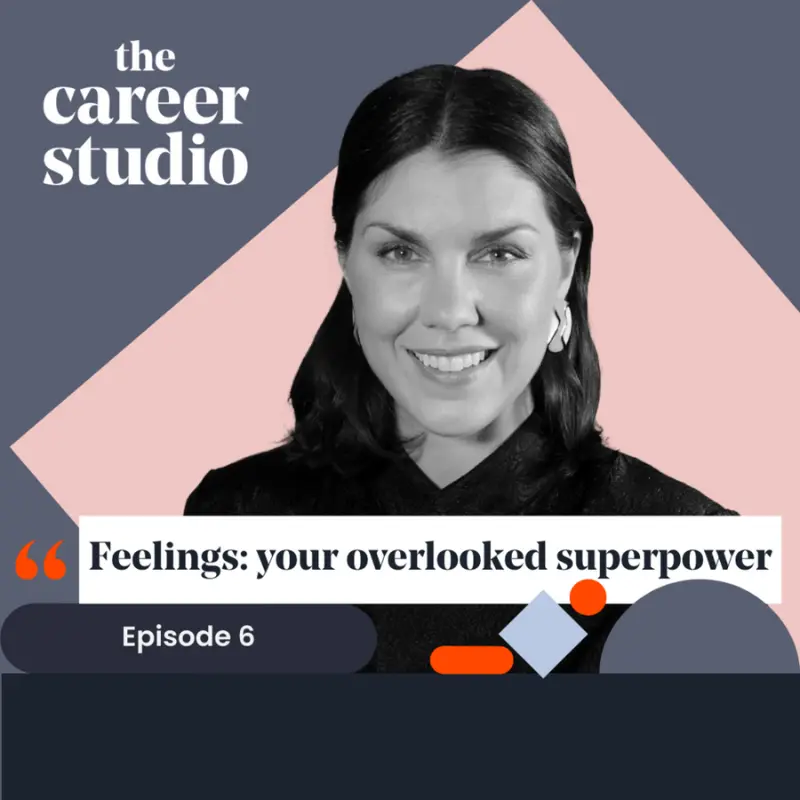Feelings: your overlooked superpower

In this episode I discuss why feelings are a superpower and how to tune into them and use them to your advantage.
Too often we try to resist, ignore, or fix our feelings, creating unwanted results in our life like procrastination, addiction, misalignment, and physical pain. When instead we learn to embrace our feelings - the good as well as the uncomfortable - we’re able to reset more quickly and avoid unwanted emotional reactions, we improve our connection to our gut - and thus our intuition, get more done, have more energy and so much more.
Take it from someone who spent most of her life ignoring and suppressing her feelings - when you learn how to genuinely feel them your world opens up and your life changes.
You’ll learn in this episode
- What we create in our life when we ignore our feelings
- How to properly experience a feeling so that it moves through and out of your body
- What we create when we fully experience our feelings
Are you ready to create an energizing career you love?
You can create a career that is simply an extension of who you are and how you want to live your life. If this sounds like what you’re after then schedule a consultation. We'll get to the bottom of what's going on for you. And exactly where you need to focus to bring your career and life into alignment. It's free!
For more from The Career Studio
Follow me on LinkedIn!
Subscribe my once a week newsletter
Enjoy the show?
- Don’t miss an episode by following The Career Studio on Spotify and follow via Apple Podcasts, Stitcher, or RSS.
- Leave me a review on Apple Podcasts
Transcript
Welcome to the career studio podcast, where we boil down the noise and focus on the core concepts, essential for building an energizing career you love. One that is simply an extension of who you are and how you wanna live your life. Anyone can do it. It's just a matter of knowing what to focus on.
Hi guys. Today I wanted to spend some time talking about feelings. Why do they actually matter? How to tune into them and how to use them to your advantage. This is a skill that I teach my clients within the mindset cornerstone from episode two. And if you listen to that, you'll know that I teach that your thoughts create your feelings. But you can't always just move past your feelings by changing your thoughts. You can't always force yourself to bypass your feelings. In order to have the flexibility that you need to shift your mindset, you also have to learn how to genuinely feel your feelings. Okay? So what do I mean by feel your feelings?
Think about a breakup, right? Your friends might say, Oh, you're better off without them, or, This is for the best, or They aren't the right person for you. But it's really hard to get on that level when you still feel sad and upset. Even if you're trying to move on quickly, it's only after you've spent a few days or weeks or months feeling sad and upset, right? Depending on how long the relationship was, that you're able to move on. Because in that time, what you've done, mostly unintentionally, is processed your feelings all the way through.
That means they were all used up and so therefore you were clearer in your body and you were able to shift your mindset into something that served you, right. This is for the best. They weren't the right person for me. I now agree with what my friends were saying. But you aren't able to access that frame of mind until you've spent that time feeling sad or upset or hurt or, or whatever is present for you as part of the break up.
What I mean by process your feelings, in that moment, is that you paid attention to your feelings and you genuinely felt them. You allowed them to exist in your body and you experienced them physically again and again until they were all used up, until there were no more feelings. I like to describe a feeling like a piece of paper that's lit on fire. If you expose fire to oxygen, that paper's eventually gonna burn up completely into dust. But if you reduce oxygen to the fire, then you create embers. That smolder, they keep warm over a long period of time, and then embers light a new piece of fuel very quickly. So processing your feelings is exposing them to a lot of oxygen.
Paying attention to them, feeling them fully, even though they feel uncomfortable, which results in burning them all up and clearing them out of your body. Ignoring or suppressing your feelings is reducing oxygen to your feelings and therefore creating smoldering embers. So these smoldering embers are still active feelings hanging out somewhere in your body. And if more fuel is given to them, say a new trigger in your environment that causes another similar emotion, then they're gonna burst into flames again.
So let me explain what I mean by that. Say that someone said something that annoyed or upset you. But you just tried to ignore it and push it down. Push away your annoyance or your hurt, right? And you keep doing this until one day they say something annoying again and you snap at them. And the reason you snap at them is because you've been pushing down your annoyance instead of processing it. So you've had all of these smoldering embers inside you just waiting to be lit on fire and eventually they are with the right fuel. And then you have this reaction that probably isn't what you wanted it to be.
Okay, so I hope that analogy made sense. And what I wanna offer you is that learning how to process your feelings is gonna help you reset more quickly and avoid unwanted emotional reactions. Okay? So processing your feelings also improves your connection to your gut, thus your intuition. It helps you get more done. It improves your energy and how you feel in your body, and a lot more. And so all of these reasons combined is why I call processing your feelings a superpower. It's kind of like how sleep solves so many things. You're more productive, you feel better, you're healthier, you're sharper.
I'd put processing your feelings into a similar category. If you learn how to do this, so many positive benefits will appear in your life, but it requires you learning how to truly process your feelings intentionally, which most people were never taught how to do, and therefore, we are going to discuss today.
This will honestly change your life. It has absolutely changed mine. So let's get into it. Let's start with actually defining feelings. Feelings are sensations that we feel in our body. Scientifically, the way that they're defined, is that feelings are neural impulses that move us to action. They prompt automatic reactive behavior that's been adapted through evolution as a survival mechanism, to meet a survival need.
Okay, so broadly there's six categories. Joy, surprise, love, sadness, anger, fear. And all other emotions are derivative of one of these six categories. They sit somewhere under the broader bucket. And what I find really strange about the society, certainly I was raised in in the US and Europe, is there's just not a lot of education around managing your feelings. Certainly not in the eighties and nineties and early two thousands when I grew up, right? So we're taught that we have feelings, and as a kid, we learn how to look at faces, name feelings, happy, sad, angry, scared. But beyond that, how to actually deal with those emotions when they arise in your body. Really not any education.
In fact, we're actually taught to suppress and avoid the automatic reactive behavior that nature has programmed into us in many cases, because the narrative that we're taught is to avoid anything that's uncomfortable. And certainly what's uncomfortable is sadness and fear and anger, and instead, we're taught to solve for happiness, pleasure, joy, excitement.
There's a writer named Glennon Doyle, and her most recent book is called Untamed, and she has a quote in there that I think encapsulates what I'm trying to say and the, and the narrative in our culture perfectly. She says;" I did not know that I was supposed to feel everything. I thought I was supposed to feel happy. I thought that happy was for feeling, and that pain was for fixing and numbing, and deflecting, and hiding, and ignoring".
Okay so, I love that quote. And I think to add to that, there's also a narrative around feelings that they are indulgent. Something for actors. That feelings are dramatic and not for focus, professional people in the corporate world. Like don't bring feelings into the workplace. Be rational, look at the data, be okay with making tough calls that don't feel good, suppress your feelings in order to excel. Or there is a narrative, especially in the upbringing of men, that feelings beyond anger, let's say, are weak, too soft, not manly. Don't be open, don't be vulnerable. Don't cry. Pain is a weakness.
Or a lot of us hear from the people that love us, things like, Oh, don't cry or look on the bright side, or don't pay attention to what they said. And obviously all of that advice is, is very well intentioned and well meaning, but it really misses out on a critical point. We are human beings biologically programmed to experience feelings that prompt reactions. We can't stop our feelings and all feelings are valid, and the hard fact is that at least 50% of the feelings are going to be uncomfortable. And if you listened again back to the mindset episode, you'll remember that one of my favorite concepts from my own coach. Is that life is a 50 50 of positive and negative experiences and feelings. Look at those six major feeling categories. Half are generally positive, joy, love, surprise, and the other half negative or uncomfortable, let's say anger, fear, sadness. Oh, like you could actually say that. Um, many people don't like surprise. So you could say that more than 50% of our feelings create negative or uncomfortable feelings.
Then the narrative in society is that those 50% of feelings are to be avoided. They're seen as a failure. We wanna resist, ignore a fix, and just generally spend as little time in them as possible. But there is a big impact to this narrative because the thing is, as I said, your feelings can't be ignored, avoided, or resisted. Try as you might. This is just how we're programmed. And you may think that you've overpowered your feelings that you are in control, that you've just tucked them back into a box where they're safely out of reach, but actually they are still hanging around in your body, smoldering like embers causing you pain in some form because you haven't felt them all the way through. You haven't processed them.
Okay? So when we do this, because we're taught to solve our happiness and resist, avoid numb uncomfortable feelings. We create the following five results and I'll walk you through those now. Result number one that we create when we don't feel our feelings, is addiction. Okay? And I don't say this word lightly, but I mean it in the sliding scale of addiction. On the low end, there's the word addiction. Like, Oh, I'm so addicted to my phone. Okay, so something we do too much that we wish we did less of. And then of course, there's the extreme version of addiction. You know, full blown life altering addiction to something that we've completely lost control to. So when we don't allow ourselves to feel uncomfortable feelings, what we tend to do is turn towards a reliable source of dopamine.
Dopamine makes our brain feel good. Okay. And you can get a dopamine hit from something like checking social media, eating, drinking, taking drugs, watching television, even working. The dopamine from being productive, from ticking something off your list can feel better than allowing yourself to feel whatever uncomfortable feeling is present. I've noticed personally that if something happens that upsets me, I tend to turn to my phone and open up social media just to take the edge off. So ask yourself, what do you turn to to take the edge off? Because that is how you're avoiding your feelings. This is called buffering and consistent buffering instead of feeling can lead to a, the addiction of whatever the thing is you use to avoid your feelings.
The second result that we create by not feeling our feelings is procrastination. Okay. And I say this as a lifelong procrastinator and, um, one of my personal biggest ahas came when I heard Adam Grant interview Margaret Atwood, and they were talking about her writing process, and she said on that episode, we procrastinate to avoid our feelings. Okay, We procrastinate to avoid our feelings. It's so true. Whatever you're procrastinating on inevitably has uncomfortable feelings attached to it.
So think about it. Maybe you have to feel confused. You have to create a concept, right? You haven't figured out in your head yet, and it requires you to work it out. And that's confusing, right? And, and feeling confused is uncomfortable. Or maybe you procrastinate on your finances because you think your finances are a mess, and this makes you feel insecure. So you're procrastinating on sorting out your finances because you wanna avoid facing the feeling of insecurity that comes up for you when you start to look at your finances. Okay? So procrastination is the avoidance of uncomfortable feelings.
Third result that we create by avoiding feeling our feelings is misalignment. So when we don't pay attention to how we feel, we miss out on signals Our body is telling us. Like, Go this way. This is what feels good. Or stop, turn around, eject, this does not feel good. So have you ever had a suspicion that something wasn't right, but you ignored it only to find out later you were right? Maybe these are personal examples. You've had a suspicion that the job you were taking wasn't gonna be a good culture fit, or that the relationship you're in wasn't going to last, but you took the job anyway, progressed with the relationship anyways. This is you ignoring your feelings.
Cuz sometimes the talk track in our brain is so loud or we're so used to listening to it and not paying attention to how we feel that we miss out on our intuition, which is a feeling. We're all up in our rational brain making a case for why we should do something and ignoring how we actually feel. And this is ultimately how we get out of alignment.
Fourth result we create by not feeling our feelings is playing small. What I mean by that is a smaller life. So when we avoid and resist uncomfortable feelings, we avoid all sorts of things that could make our life bigger or get us closer to the goals we have for our life. Help us achieve the things we want. So here's a few examples. A couple years ago I was asked to speak in front of a couple hundred people, and I have really never enjoyed public speaking, so I knew I would be nervous and anxious, and if I was afraid of feeling nervous and anxious, I would've said no to the offer, which would've closed down an opportunity for my business to grow.
Or another example, if you are scared of flying, but you have always wanted to go to Bali. But you're unwilling to face your fear or do the work to make planes and plane journeys less scary. Then you're gonna spend your whole life dreaming of Bali, wishing you could go and feeling sad you can't because you're simply too scared of feeling scared.
So resisting uncomfortable feelings just closes down a lot of avenues that we might want to explore in our life. Okay, fifth final example I'm gonna give today of the result of not feeling your feelings is experiencing physical pain. Long suppressed emotions hang out in our body like embers smoldering.
Okay? So think about how when you get super stressed at work, you get shoulder and back pain. There is a fascinating book by an NYU doctor named John Sarno called Healing Back Pain, and he's actually now deceased, but he ran a clinic at NYU that specifically addressed chronic back pain as a result of unacknowledged or not dealt with anger or anxiety. And what he would actually do instead of full blown back surgery, is he would help them acknowledge and process their suppressed anger or anxiety, and literally their back pain would go away, debilitating back pain that had plagued these people for years. This book is going to blow your mind if you are intrigued. The case studies are very impressive. If you have chronic back pain, I, I strongly encourage you to read it.
Or perhaps a more relatable example if you don't have back pain is just think about how much lighter your body feels after you've had a big cry, or after you finally had that uncomfortable conversation that you wanted to have with someone that you love, right? And then you guys made up and you finally got off your chest, whatever it was. The reason you feel so much lighter is because you've processed your feelings fully. You've addressed them. You've acknowledged them. You took action against them and they're no longer physically weighing you down.
Okay, so let me just recap. Addiction, procrastination, misalignment, lost connection with your gut, a smaller life and physical pain. All of these are results of not feeling your feelings and this, this is why feeling your feelings is such a superpower. Because if you can feel your feelings, you transform so much important stuff. Okay, so let's talk about how you actually feel them. How do you actually process feelings, right? I've been talking a lot about it, how important it is. Now I'm actually gonna walk you through how to process feelings.
So first you have to accept that 50% of life is uncomfortable feelings. And that avoiding, resisting, ignoring, numbing does not create the results you want in your life. And, you have to be willing to feel uncomfortable or at least try, right? I'm open to trying to feel uncomfortable. I promise you you can do it. I promise you, you won't die. And in fact, an uncomfortable feeling is around for less time in your body if you process it. Then if you resist it and ignore it and turn it into a smoldering ember that stays around and gets activated from time to time.
Okay, so ultimately in the long run, you're gonna spend less time feeling uncomfortable if you're willing to actually feel it. All right? When you notice you're upset about something, tune in to your body and if there's something you're upset about that's really present for you as you're listening to this. Do this live with me now. Pause this episode right now and just spend a few seconds or minutes getting yourself into a space where you're remembering the situation and you feel uncomfortable or upset. So when something uncomfortable is happening in the body, you want to get curious and look for any vibrations or sensations or tension in your body.
So it could be a tightness in your chest, your belly, a tingling somewhere, a tension in your back or neck. Just look for anything. And the sensation might be super strong or it might not be that strong. That's okay. Just look for any area that isn't calm and relaxed and clear. You wanna look for tension, you wanna look for blockages. And once you find that, You wanna get really specific and do your best to describe it. So some of the things you could use are, where is it located? What is the shape? How big is it? How dense is it? What's the texture? Does it have a rhythm? Does it have a temperature? If you had to give it a metaphor, what would it be?
Is it like a rubber ball? A craggy rock, seltzer water, a knotted rope, a foggy cloud, a sharp almond. Anything, anything is good. Sometimes actually giving it a metaphor really helps you feel it and visualize it in your body. Okay, so once you've done that, focus on the location and the feeling and just let this feeling burn or bubble, or feel tight or heavy. Whatever it is, let it express itself without resisting or ignoring. Let the discomfort be your focus and your experience, and as you let it express itself, just imagine that the feeling is being emanated or released out of your body into the air. Okay? So feel it. Let it express itself and release it. And basically this is it.
You just keep doing this until the feeling is no longer there. And this might take minutes or hours or days or months or years. It just depends on the nature of the emotion. And when you get good at this, you can do this while you're just going about your life. You don't have to stop and take a year to process your feelings.
You just do it in conjunction with the rest of your life. All right? So feeling annoyed because you missed your train by one second. That might take a few minutes to process, but feeling grief from a broken heart that might take months. Okay. So importantly, once you've processed your feelings, not only are you going to feel lighter, but you're gonna be able to access the wisdom on the other side, that kind of new perspective that you're able to access.
Once you feel your feelings, you often realize something about yourself, about another person, about your life, about what's important to you, et cetera. Okay? And when you learn how to do this, these are the results that you're gonna see in your life. Basically the opposite of what I presented earlier, but I'm gonna walk you through them.
One, when you allow yourself to feel your feelings, you're going to spend less time doing those things you always wish you did less of, be it watching TV, or drinking wine, or eating cookies, or smoking weed, or checking Instagram because you no longer need those things to avoid your feelings because you're willing to feel your feeling.
And so then you're gonna fill your time doing whatever else it is you wanna be doing with your life instead of those things that you feel slightly addicted to. Second result, less procrastination, more time doing the things that are important to you on your to-do list. Because again, you aren't afraid to feel uncomfortable feelings that come with the things on your to-do list. You know how to actually allow those uncomfortable feelings associated with the task and still do the task. You aren't afraid of experiencing a little bit of insecurity when you open up your bank statements and start to do the work. You're willing to feel it while you do whatever it is you need to do.
Third result, better connection to your gut. When you start to tune into your body. You really start to pay attention to how it feels, and you're gonna start to tune into your body when you feel confused, you're gonna know what warm and open and excited feels like, and you're gonna know what cold and closed and obligated feels like.
It's like you're learning a new language. The more time that you spend practicing feeling your feelings, the more in touch with your feelings you'll be. Right, and it's gonna make decisions easier and faster, and you're going to be able to use your body in conjunction with your brain to go more quickly in the direction that's the best fit for you.
Fourth result, extra energy and lightness in your body, right? Cuz you aren't carrying the weight of the emotions that have been physically triggered, but that you aren't actually feeling right? You're trying to ignore them and suppress them, and you're not giving your body a chance to feel them all the way through and they're hanging out as smoldering embers in your body using up energy. When you get rid of all your smoldering embers, you're going to have so much more energy.
And fifth, and I'm finishing on this, you're gonna have a bigger life because when you are okay with feeling any emotion and you actually know how to do that, there's literally nothing you can't do. Like speak in front of loads of people, or start that YouTube channel or take that 24 hour flight to Bali. When you aren't afraid of feeling nervous or embarrassed or scared or disappointed because you know how to feel and move through that discomfort and know that you will be okay on the other side, then the world is your oyster, and that is really exciting.
So feeling your feelings is a secret to unlocking so many of the things that are important to us. It's okay to have uncomfortable feelings. They are 50% of life, and part of being human. And resisting them creates more harm than good. All you have to do is tune into your body and let them express themselves without resisting.
And if you continue to do that, you're going to come out the other side faster and lighter and wiser and closer to the life you want. So start this week, get curious and start feeling.
Hey, if you're ready to create an energizing career you love one, that is simply an extension of who you are and how you want to live your life. Then I wanna invite you to schedule a consultation. We'll get to the bottom of what's going on for you. And exactly where you need to focus to bring your career and life into alignment. It's free. Just head on over to thecareer.studio/schedule to find a time that works for you, or if you're enjoying and getting value from these episodes, I'd love you to leave a short review on whatever podcast app you use.
This helps other people like you find and get value from the podcast too.



